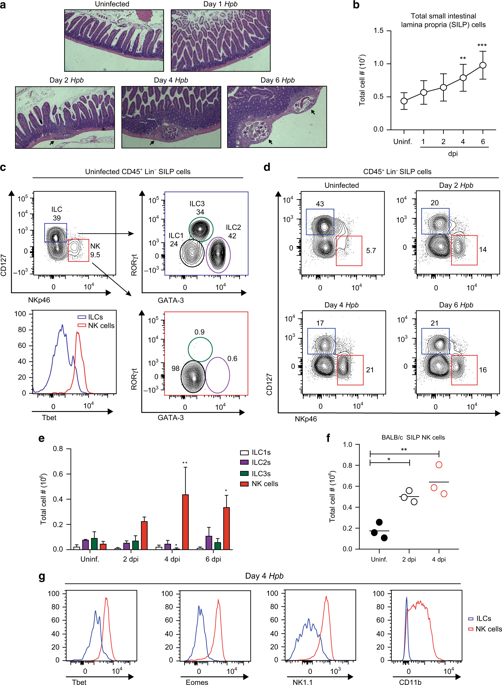Mucosal Immunology ( IF 8 ) Pub Date : 2019-11-27 , DOI: 10.1038/s41385-019-0231-8 Maria E Gentile 1, 2 , Yue Li 1, 2 , Amicha Robertson 2, 3 , Kathleen Shah 2, 4 , Ghislaine Fontes 1, 2 , Eva Kaufmann 1, 5 , Barbara Polese 1, 2 , Nargis Khan 1, 5 , Marc Parisien 6 , Hans M Munter 7 , Judith N Mandl 8 , Luda Diatchenko 6 , Maziar Divangahi 1, 2, 5 , Irah L King 1, 2

|
Parasitic helminths cause significant damage as they migrate through host tissues to complete their life cycle. While chronic helminth infections are characterized by a well-described Type 2 immune response, the early, tissue-invasive stages are not well understood. Here we investigate the immune pathways activated during the early stages of Heligmosomoides polygyrus bakeri (Hpb), a natural parasitic roundworm of mice. In contrast to the Type 2 immune response present at later stages of infection, a robust Type 1 immune signature including IFNg production was dominant at the time of parasite invasion and granuloma formation. This early response was associated with an accumulation of activated Natural Killer (NK) cells, with no increase of other innate lymphoid cell populations. Parabiosis and confocal microscopy studies indicated that NK cells were recruited from circulation to the small intestine, where they surrounded parasitic larvae. NK cell recruitment required IFNγ receptor signaling, but was independent of CXCR3 expression. The depletion of tissue-infiltrating NK cells altered neither worm burden nor parasite fitness, but increased vascular injury, suggesting a role for NK cells in mediating tissue protection. Together, these data identify an unexpected role for NK cells in promoting disease tolerance during the invasive stage of an enteric helminth infection.
中文翻译:

NK 细胞募集限制了肠道蠕虫感染期间的组织损伤
寄生虫在宿主组织中迁移以完成其生命周期时会造成重大损害。虽然慢性寄生虫感染的特征是 2 型免疫反应,但早期的组织侵入阶段尚不清楚。在这里,我们研究了 Heligmosomoides polygyrus bakeri (Hpb) 早期阶段激活的免疫通路,Hpb 是一种小鼠的天然寄生蛔虫。与感染后期出现的 2 型免疫反应相反,在寄生虫入侵和肉芽肿形成时,包括 IFNg 产生在内的强大 1 型免疫特征占主导地位。这种早期反应与激活的自然杀伤 (NK) 细胞的积累有关,而其他先天性淋巴细胞群没有增加。寄生虫和共聚焦显微镜研究表明,NK 细胞从循环系统中募集到小肠,在那里它们包围寄生虫幼虫。NK 细胞募集需要 IFNγ 受体信号,但不依赖于 CXCR3 表达。组织浸润性 NK 细胞的耗尽既没有改变蠕虫负荷也没有改变寄生虫适应性,但增加了血管损伤,表明 NK 细胞在介导组织保护中的作用。总之,这些数据确定了 NK 细胞在肠道蠕虫感染的侵入阶段在促进疾病耐受性方面的意想不到的作用。组织浸润性 NK 细胞的耗尽既没有改变蠕虫负荷也没有改变寄生虫适应性,但增加了血管损伤,表明 NK 细胞在介导组织保护中的作用。总之,这些数据确定了 NK 细胞在肠道蠕虫感染的侵入阶段在促进疾病耐受性方面的意想不到的作用。组织浸润性 NK 细胞的耗尽既没有改变蠕虫负荷也没有改变寄生虫适应性,但增加了血管损伤,表明 NK 细胞在介导组织保护中的作用。总之,这些数据确定了 NK 细胞在肠道蠕虫感染的侵入阶段在促进疾病耐受性方面的意想不到的作用。



























 京公网安备 11010802027423号
京公网安备 11010802027423号